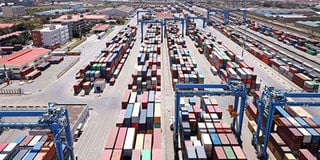State mandarins and politicians make a killing at inland port

The Inland Container Depot in Nairobi. To promote efficiency, the government reduced the number of government agencies at the ICD. PHOTO | FILE | NATION MEDIA GROUP
What you need to know:
- A committee was formed to come up with strategies on how to improve efficiency and cost effectiveness of transportation of cargo using SGR.
- Investigations have seen KPA Daniel Manduku and KRA Commissioner for Customs Kevin Safari questioned by the DCI.
The decision to demand clearance of cargo from Mombasa at the Inland Container Depot (ICD) in Nairobi two years ago created a chance for politicians and senior government employees to make a killing from the ensuing congestion, the Nation reports.
Two years after the controversial decision was made, investigations have been launched to establish how two companies linked to powerful politicians were given a tender to construct peripheral cargo storage facilities on behalf of the Kenya Ports Authority (KPA) next to the ICD.
One of the companies, Mitchel Cotts, is linked to Baringo Senator Gideon Moi and retired President Daniel arap Moi’s aide Joshua Kulei.
The other company — Nairobi Inland Cargo Terminal — has hidden its ownership in layers, according to a search done by the Nation, but has a Mr John Katiku among its shareholders.
The peripheral storage facilities are currently being used to store cargo which, for whichever reason, have overstayed at the ICD in order to reduce congestion.
At that time, it was reported that the ICD had over 30,000 twenty-foot equivalent units (TEUs) containers at ICD in Nairobi.
ARTIFICIAL CONGESTION
This is because the government, which had realised that the standard gauge railway (SGR) freight service was not doing as well as it had projected, insisted that all inland cargo be cleared in Nairobi.
As a result, container traffic on the SGR shot up by four times, with the ICD receiving up to seven trains of cargo per day from just one when the freight service was launched in December 2017.
However, the ICD could only handle 15,000 TEUs, and unscrupulous officials at the ICD devised ways of creating cargo-clearance delays like had been the case at the Mombasa port in order to make money.
UHURU'S CONCERN
Soon there was an outcry from importers, saying they were losing up to Sh70 million daily on storage and detention charges due to cargo pile-up at the ICD.
The massive delays even made President Uhuru Kenyatta to make impromptu visits to the ICD on two occasions to deal with the situation, but a solution was not forthcoming.
Unable to deal with the mess, the government formed a technical committee that was supposed to come up with strategies on how to improve efficiency and cost effectiveness of transportation of cargo using SGR.
One of the strategies was to reduce the number of government agencies at the ICD.
STORAGE TENDER
At the time, there were 27 government agencies operating at the inland depot. “The only processes required at the port are cargo movement from vessel to the rail side, cargo loading, train marshalling, cargo quality inspection and customs clearance.
The critical agencies required at the port are: Kenya Ports Authority (KPA), Kenya Revenue Authority (KRA), Kenya Railways (KR) and Kenya Bureau of Standards (KEBS),” said the committee.
“Any other interventions could take place outside the port in line with international practices to reduce inefficiencies,” it recommended.
Consequently, the Head of Public Service sent a memo to the agencies operating at the ICD and ordered them to reduce their presence at the facility.
LUCRATIVE DEAL
Additionally, KPA was allowed to lease Periphery Storage Facilities (PSFs) outside the ICD.
“Congestion usually happens when you are operating at nearly 100 per cent, like what we are currently experiencing at the Port of Mombasa,” KPA Managing Director Daniel Manduku said at the time.
That was in mid-2018. A tender was floated with the hope of getting two companies that can cumulatively provide storage for an extra 6,000 twenty-foot equivalent units of containers.
The Nation is aware that about 30 companies applied for the lucrative tender.
And while the idea seemed noble, investigators have a reason to believe the two firms did not win fairly.
MANDUKU QUESTIONED
The Directorate of Criminal Investigations (DCI) has launched investigations on how Mitchel Cotts and Nairobi Inland Cargo Terminal were approved to create the peripheral storage facilities which they later leased to KPA.
It is said the two firms were not among the 30 companies that tendered for the contracts.
The investigations, which began shortly before Christmas, have seen senior KPA managers, including embattled MD Daniel Manduku, and KRA Commissioner for Customs Kevin Safari make a trip to the DCI for questioning.
Mr Safari spent the whole day at the DCI headquarters ON Kiambu Road, Nairobi, on Thursday. He told the Nation there is nothing to worry about.
BLAME GAME
Several officials from the Customs and Border Control Department at KRA have been questioned.
“It will be good to note however that the role of issuing contracts for the peripheral storage facilities is a KPA role. KRA only inspected the facilities before they were commissioned, as required by law,” Mr Safari said.
“Investigations are however what they are. Some people will be suspects, and others will be State witnesses, and others will be let free,” he said.





